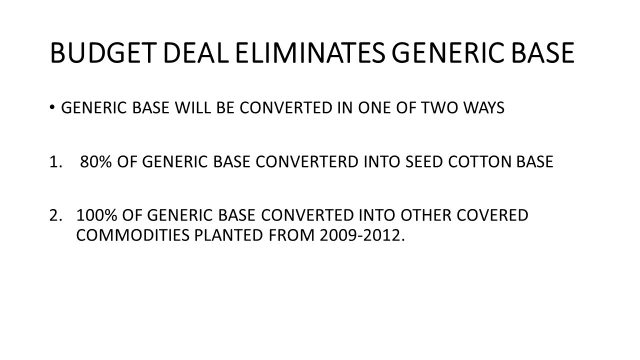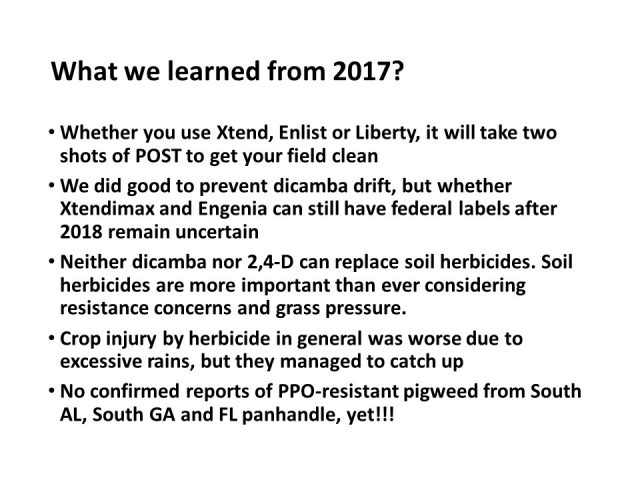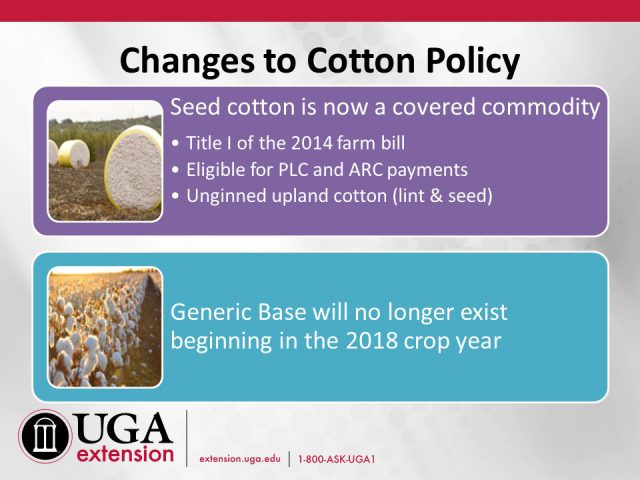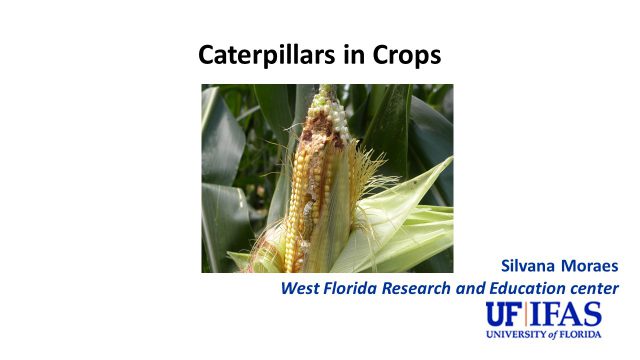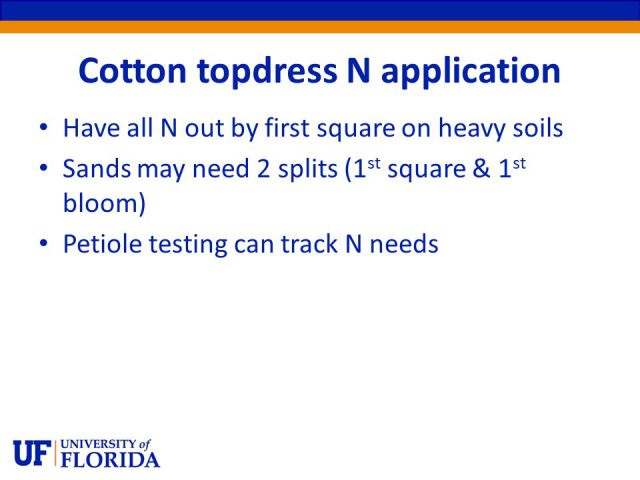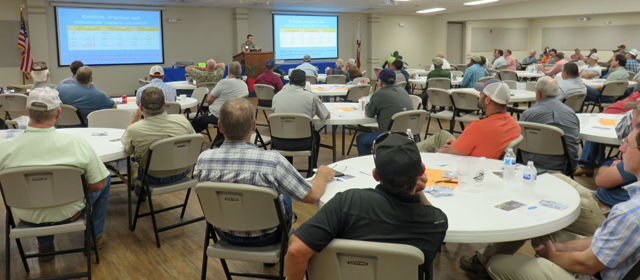
A total of 115 people came out for this year’s Panhandle Row Crop Short Course, from eleven Florida counties, three Georgia counties, and four Alabama counties.
This year’s Panhandle Row Crop Short Course took place on Thursday, March 1, 2018. Extension Specialists from Florida, Georgia, and Alabama spoke to attendees providing production recommendations and various management tips for row crops farmers. Continuing education units (CEUs) were offered at the event for those with a restricted use pesticide license (Florida, Georgia and Alabama), as well as for Certified Crop Advisors. A total of 115 people came out for this year’s event, that number consists of attendees from eleven Florida counties, three Georgia counties, and four Alabama counties. The event featured nine presentations and a trade show of 17 companies and organizations that provide products and services to the industry.
The focus of the Short Course was primarily on peanut and cotton production, but did overlap to other crops regarding fertility, pest management, and the market outlook. Speaker topics included an update from the Florida Peanut Producers Association, information regarding peanut varieties, cotton varieties, weed management, pest management (insect, disease, nematode), market outlook, and early season fertility. The following recap provides a short summary of what was discussed by each speaker, as well as direct links to download PDF (printable) versions of the presentations given at the event.
Industry Update
Ken Barton, Executive Director of the Florida Peanut Producers Association (FPPA) provided an update on the current status of the peanut industry, along with the goals of the FPPA. The fact that generic base will no longer exist for the 2018 crop year.
Presentation link: Barton – Florida Peanut Producers Update
Peanut Variety Selection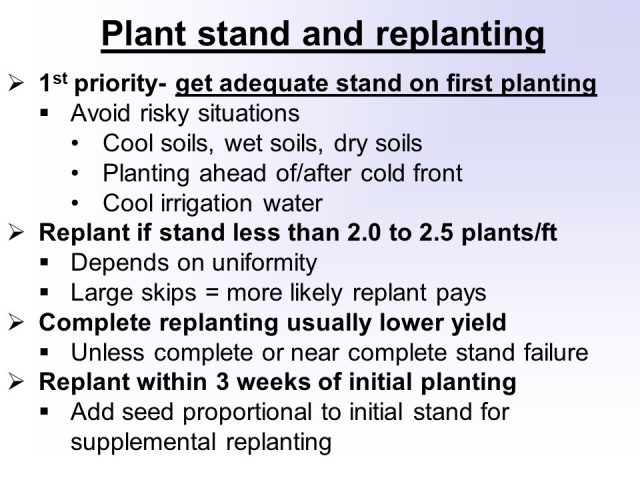
Dr. Barry Tillman, UF/IFAS Peanut Breeder provided variety data from trials across several states demonstrating trends in performance. Hypothetical production situations were used to illustrate management decisions based on factors such as planting date, disease pressure, and risk. He also discussed seed availability for different varieties.
Presentation link: Tillman- Managing Your Favorite Peanut Variety
Cotton Variety Performance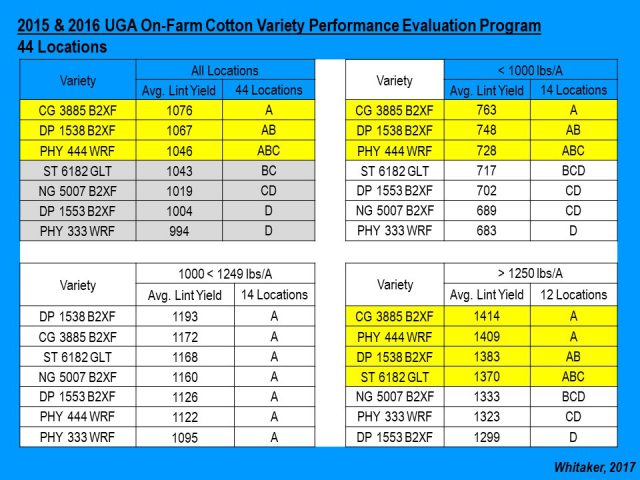
On behalf of Dr. David Wright, Ethan Carter, UF/IFAS Regional Crop IPM Extension Agent presented a talk on cotton performance and varieties. Information shared included both data from research stations and on-farm trials across Georgia and Florida. Across many trials at multiple locations, consistently top yielding varieties included ST 6182, DP 1538, DP 1646, CG 3885, and PHY 444.
Presentation link: Wright- Making Replant Decisions for Cotton and Peanut
Nematode Management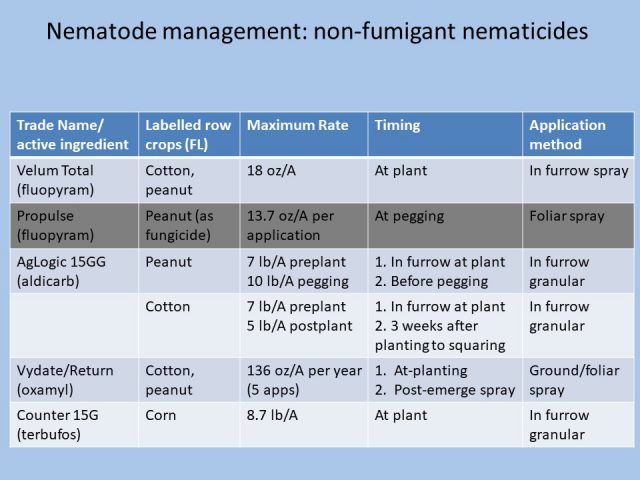
Dr. Zane Grabau, UF/IFAS Crop Nematologist discussed nematicide options available to crop farmers, some new to the market and others returning. He presented data from a series of cotton and peanut trials that took place on research stations, as well as two on-farm trials in Jackson County. The Jackson County on-farm trials were looking at Velum Total, Telone II and AgLogic 15GG. Once again, Telone II is expected to be in short supply and difficult to find. The active ingredient in AgLogic 15GG is aldicarb, the same as Temik, and a permit will need to be obtained from FDACS for those interested in its use.
Presentation link: Grabau- Nematode Management
Crop Disease Management
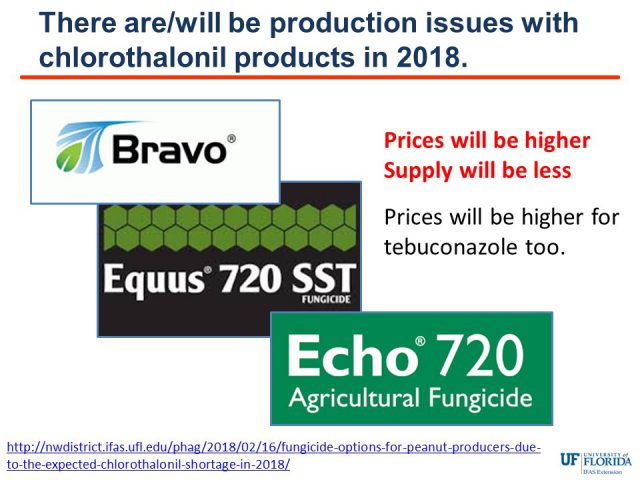 Dr. Nicholas Dufault, UF/IFAS Crop Pathologist focused his talk on the performance of peanut fungicides. It is important to know which pathogen you are treating, and confidently select an effective product for its control. Chlorothalonil, a back bone of many spray programs will be in short supply this year, and a higher price can be expected.
Dr. Nicholas Dufault, UF/IFAS Crop Pathologist focused his talk on the performance of peanut fungicides. It is important to know which pathogen you are treating, and confidently select an effective product for its control. Chlorothalonil, a back bone of many spray programs will be in short supply this year, and a higher price can be expected.
Presentation link: Dufault- Crop Disease Management
Herbicide Use/Weed Management
Dr. Steve Li, Auburn Weed Specialist discussed the control of hard to kill weeds in crop systems. He also discussed auxin herbicides and the newly labeled Enlist One for Florida. Good weed control can be achieved using some older products as well as the new ones, but it is important to continue using soil herbicides.
Presentation link: Li – Herbicide Use/Weed Management
Crop Market Outlook
Dr. Adam Rabinowitz, UGA Economist provided a detailed analysis of the crop commodity markets. He covered several commodities, their utilization within the market, and inputs. Understanding what factors drive the market and the projected revenues/costs associated with growing different crops will allow producers to make informed decisions. When it comes to being well versed with your farm’s expenditures and income potential, this year is no exception. With generic base gone for the 2018 year, growers need to familiarize themselves with the conversion options available and do what is best for their specific situation.
Presentation link: Rabinowitz- Crop Market Outlook
Caterpillars in Crops
Dr. Silvana Moraes, new UF/IFAS Entomologist discussed her research program and the goals of her work. She talked about the seasonal occurrence of pests that affect cotton and peanut, as well as their specific life cycles and potential control measures. Identification is crucial for insect control, controlling corn earworms vs armyworms or soybean loopers vs velvetbean caterpillars will affect your product options and can impact price.
Presentation Link: Moraes – Caterpillars in Crops
Early Season Fertility
Dr. Michael Mulvaney, UF/IFAS Cropping Systems Specialist spoke on the importance of soil testing and how soil health relates directly to the early season fertility of the crop. Recognizing the nutritional need of a crop, and being able to identify symptoms of deficiency are key in maintaining a healthy field. With delayed or skipped gypsum applications in peanut, prioritize fields with <250 ppm Ca (500 lbs Ca/ac).
Presentation link: Mulvaney- Early Season Fertility
Sponsors and Trade Show Exhibitors
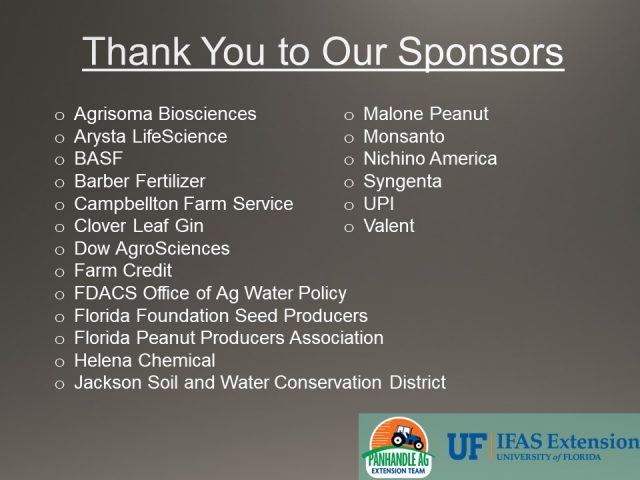 These 17 companies and organizations that provide products and services to crop farmers in the region took part in the Trade Show and made lunch possible for not only this event, but also the upcoming Peanut Field Day in August.
These 17 companies and organizations that provide products and services to crop farmers in the region took part in the Trade Show and made lunch possible for not only this event, but also the upcoming Peanut Field Day in August.
Upcoming Events
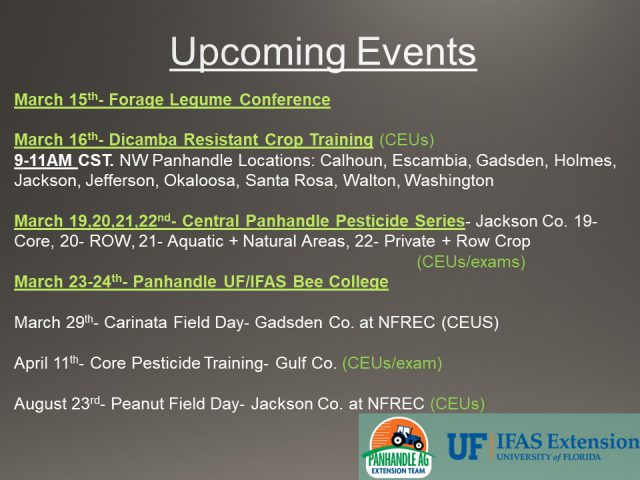 There are a number of upcoming educational events taking place across the Florida Panhandle. Watch the newsletter for promotional materials regarding these events, or call the Extension Office in your county for more information.
There are a number of upcoming educational events taking place across the Florida Panhandle. Watch the newsletter for promotional materials regarding these events, or call the Extension Office in your county for more information.
- 2025 Peanut Field Day Recap & Speaker Handouts - August 29, 2025
- Peanut Foliar Diseases Exploding Across Florida - August 22, 2025
- Provisional Nitrogen Fertilization Recommendation for Florida Cotton for the 2025 Season - June 20, 2025

